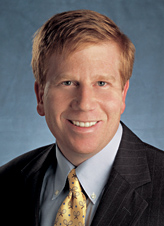| |
 |
| |
Robert
Moskow '96 |
| |
|
Alumni
Profile: Robert Moskow '96
Brain
food
Food
and agribusiness analyst Robert Moskow '96 studies companies
that sustain us
By
Aubrey Henretty
When
Robert Moskow '96 enrolled in the Kellogg Full-Time
MBA Program, he was looking for an experience that would help
shape his career. He had consulted for some of the nation's
premier packaged-foods companies, including Kraft and Oscar
Mayer. But he wanted to channel his interest in the food industry
into something enduring and satisfying.
"I
really enjoyed the analytical and the strategic side of companies
more than the execution," says Moskow. "I wanted
to be in a place where I could spend all day doing research
and finding out what makes companies tick."
Following
post-Kellogg stints in marketing for Warner Lambert and Godiva
Chocolatier, Moskow found just such a place in Credit Suisse
Securities LLC. As the firm's lead food and agribusiness stock
analyst, Moskow now spends his days publishing research on
22 top companies.
Agriculture
is big business in the United States, but Moskow points out
that Americans are spending less on food than they have at
any time in history. "Food as a percentage of income
in the United States has actually declined," he says.
According to the U.S. Department of Agriculture's Economic
Research Service, the average household spent 18.1 percent
of its income on food in 1956. By 2006, that figure had dropped
to 9.9 percent. "One of the qualities of a developed
Western nation is that citizens spend less and less time worrying
about, 'How am I going to eat today?'"
If
average citizens are spending less time thinking about how
food gets from the fields to their plates, agribusiness analysts
like Moskow are picking up the slack.
"You
have to have a thesis about where the world is going,"
he says. "Then you start thinking about the value chain."
An analyst might be interested in how rising grain prices
will influence the decisions of chicken farmers and how their
actions will reverberate throughout the market. For larger
questions, including the effect of global climate change on
the world's food supply, Moskow thinks the companies he studies
will need to remain agile and resourceful. "If you've
got an area that's going to become rainier, well, sometimes
more rain is a good thing," he says. "Food companies
need to think about which parts of the world have the highest
potential for productivity and demand growth, then develop
their asset footprints accordingly."
Other
big questions surrounding agribusiness concern the increased
demand for biofuels and the booming economies in large Asian
nations. As countries like China get wealthier and consume
more meat (and more food in general), they will need more
grain to sustain themselves, says Moskow. If this increased
demand coincides with a major U.S. public-policy shift toward
biofuels, demand for certain grains may outpace supply.
While
the United States may be able to afford a biofuel-related
increase in the price of its food, other nations may not.
Unlike their U.S. counterparts, Chinese households spend roughly
28 percent of their income on food, Moskow says. A sharp increase
in food prices would thus be more difficult for the Chinese
economy to absorb and may lead China to substantially increase
imports.
Looking
forward, says the Kellogg graduate, "The biggest challenge
for agribusiness is going to be: How can they pass along the
inevitable rising costs of these soft commodities to the end
user and how can they use this dynamic to enhance their profitability?"
Moskow
says his Kellogg education helps him create frameworks that
assess the complexities of agribusiness and predict how industry
leaders may respond. Kellogg is a presence in Moskow's family
too: His wife, Holly, is a 1996 graduate and his father, Michael,
is a member of the Dean's Advisory Board (and also recently
retired as president and CEO of the Federal Reserve Bank of
Chicago).
"I
use what I learned at Kellogg to study industry dynamics,"
he says. "Having an academic background in industry analysis
is probably the most important thing when you're analyzing
stocks. What you learn in management and strategy classes
at Kellogg is very useful."
|



